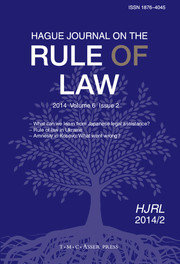Article contents
The False Friends Problem for Foreign Norm Transplantation in Developing Countries
Published online by Cambridge University Press: 16 October 2014
Abstract
This article investigates the difficulties in transplanting global legal norms into developing countries, specifically the problem of ‘false friends.’ This is a linguistics concept describing the situation where there is a striking resemblance between two words in two different languages, leading speakers of each language to assume, incorrectly, that they understand the word's meaning in the other language. Even more problematically, the misunderstanding is hidden by the assumption of understanding. We argue that similar problems can occur when there is a superficial similarity (but a fundamental mismatch) between particular global and local norms. We illustrate this through the example of global intellectual property regimes and their reception in Vanuatu and Mexico, showing how reforms are sometimes welcomed into developing countries on the basis of false assumptions that their aims are congruent with existing understandings. Finally, the paper develops some policy implications for avoiding the ‘false friends’ problem in a transnational legal context.
Information
- Type
- Articles
- Information
- Copyright
- Copyright © T.M.C. Asser Press and the Authors 2014
- 5
- Cited by

